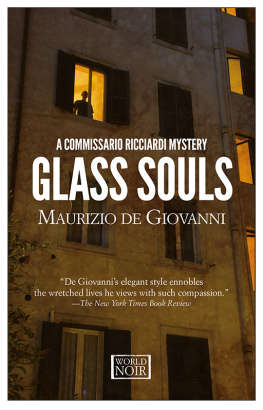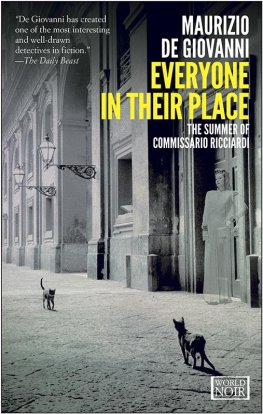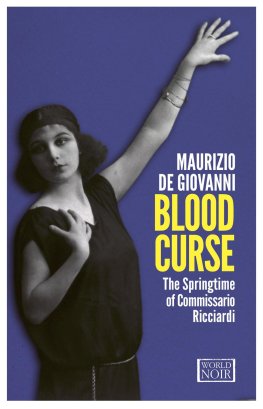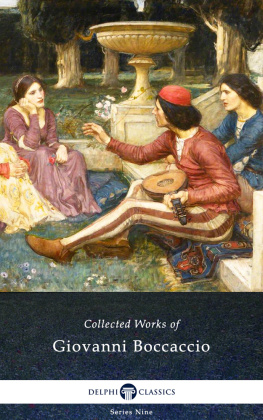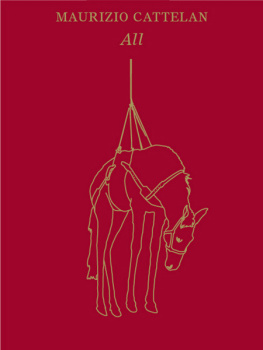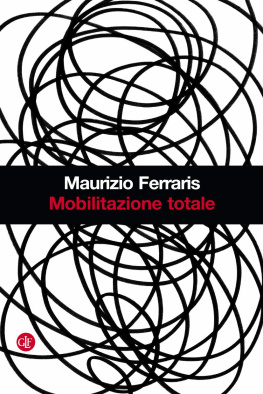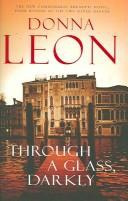Maurizio de Giovanni - Glass Souls : Moths for Commissario Ricciardi
Here you can read online Maurizio de Giovanni - Glass Souls : Moths for Commissario Ricciardi full text of the book (entire story) in english for free. Download pdf and epub, get meaning, cover and reviews about this ebook. City: Italy., La Vergne, year: 2017, publisher: Europa Editions UK, genre: Art. Description of the work, (preface) as well as reviews are available. Best literature library LitArk.com created for fans of good reading and offers a wide selection of genres:
Romance novel
Science fiction
Adventure
Detective
Science
History
Home and family
Prose
Art
Politics
Computer
Non-fiction
Religion
Business
Children
Humor
Choose a favorite category and find really read worthwhile books. Enjoy immersion in the world of imagination, feel the emotions of the characters or learn something new for yourself, make an fascinating discovery.
- Book:Glass Souls : Moths for Commissario Ricciardi
- Author:
- Publisher:Europa Editions UK
- Genre:
- Year:2017
- City:Italy., La Vergne
- Rating:3 / 5
- Favourites:Add to favourites
- Your mark:
- 60
- 1
- 2
- 3
- 4
- 5
Glass Souls : Moths for Commissario Ricciardi: summary, description and annotation
We offer to read an annotation, description, summary or preface (depends on what the author of the book "Glass Souls : Moths for Commissario Ricciardi" wrote himself). If you haven't found the necessary information about the book — write in the comments, we will try to find it.
Glass Souls : Moths for Commissario Ricciardi — read online for free the complete book (whole text) full work
Below is the text of the book, divided by pages. System saving the place of the last page read, allows you to conveniently read the book "Glass Souls : Moths for Commissario Ricciardi" online for free, without having to search again every time where you left off. Put a bookmark, and you can go to the page where you finished reading at any time.
Font size:
Interval:
Bookmark:
MAURIZIO DE GIOVANNI
The Crocodile
I N THE C OMMISSARIO R ICCIARDI SERIES
I Will Have Vengeance:
The Winter of Commissario Ricciardi
Blood Curse:
The Springtime of Commissario Ricciardi
Everyone in Their Place:
The Summer of Commissario Ricciardi
The Day of the Dead:
The Autumn of Commissario Ricciardi
By My Hand:
The Christmas of Commissario Ricciardi
Viper:
No Resurrection for Commissario Ricciardi
The Bottom of Your Heart:
Inferno for Commissario Ricciardi
I N THE B ASTARDS OF P IZZOFALCONE SERIES
The Bastards of Pizzofalcone
Darkness
for the Bastards of Pizzofalcone
To Mamma Edda, for her song and for all the songs.
To Patrizia, enchantment within enchantment.
T he young man narrows his eyes in order to accustom them to the rooms dim light. The blazing afternoon sun stretches its fingers through the slats of the tightly fastened shutters, and dust dances in the light. The woman of indeterminate age who ushered him in now slips silently away, closing the door behind her with a faint click.
The young man stands there. He can just make out the outlines of the furniture, piles of books, and a shapeless mass, perhaps an armchair, from which comes the sound of labored breathing. He waits. He shifts the weight of his body from one foot to the other. Maybe the mans asleep, he thinks to himself; the woman didnt say a word. I wonder who she is: a housekeeper. His daughter. Some relative.
He makes up his mind to venture a greeting and says buongiorno, in a faint voice.
Welcome, says the armchair. Open the window, if you please.
The voice is scratchy, the words slurred. He must have been sleeping, thinks the young man, feeling hes been rude. Forgive me, he murmurs, youd asked me to come at three and I...
I know that, says the armchair, brusquely. Open the window, just one side though. If you please.
Taking care where he sets his feet out of fear he might knock something over or step on something, the young man makes his way to the window and opens one shutter. The light comes flooding in, a powerful glare that makes him blink. He takes a quick glance out at the stunning panorama, though it impresses him less than it did before, when he sat on the low wall outside for a full hour, waiting for the appointed time. The sea stretches out, glittering, before him, and the island seems close enough to reach out and grab.
He turns around. The light washes over a dusty bookcase packed to bursting with volumes, phonograph records, knick-knacks, and objects of all shapes and sizes. The room isnt particularly large, or perhaps it just looks smaller because of the immense number of things in it. The young mans eyes wander the room curiously. Now the armchair, set off to one side, just out of the shafts of light angling in through the window, reveals its guest.
I know what youre looking for, says the old man. Its right behind you.
The young man turns around and sees it; or perhaps we should say, he sees the case containing it. He steps aside, moving away from it as if driven by an impulse of respect and shyness. The old man laughs softly.
Bring it here, he says. And come over here and sit by me.
As he says it, he clears a bundle of papers off a low stool, a foot or two away from the armchair. By now his eyes are used to the light, and the young man recognizes the musical staffs, the notes that run the width of the paper. Outside, a dove coos insistently for a couple of seconds, and then flies away.
You play the mandolin very well, says the old man. Youre good. Really good.
The young man is tempted to ask how the old man knows that and where he heard him play. But the old man hadnt asked him a question, and the young man has learned to answer only when he is asked.
The old man goes on: I came once to hear you play. Id been told about you, and when you asked to meet with me, I became even more curious. Youre good. And you have a nice voice, too.
He sits without speaking for a while, and the young man finally cant resist: did you really come to hear me play? Then why didnt you let me know you were there? I... it would have been an enormous honor. It was, certainly, an enormous honor. Id have... well, Id have welcomed you in the manner you deserve.
Once again, the old man laughs softly. Thats exactly why I didnt let anyone know. I wanted to hear you the way you are. I wanted to hear what you know how to do. Give it to me.
The old man takes the case in his hands. He cant play, thinks the young man. His hands are gnarled and twisted with arthritis, and if Im not mistaken theyre shaking. Hes an old man. I was wrong to come, theres nothing he can give me. An old man.
You must be thinking that Im an old man, says the old man. Nothing but a poor old man. And you look at my hands, all twisted. Theyre shaking. And youre probably thinking: how on earth can he even play?
No, no, says the young man, how can you say such a thing? You... your name is a legend, for all of us. Id never dare.
The old man nods.
Its true, Im old. And I wouldnt be able to play, if you only used your hands to play. Not the way you do, when you play with just your hands.
Theres a certain harshness in the old mans voice. Like an accusation. And yet theres been no change in his tone, which remains flat and low. A shiver runs through the young man, who asks: Why do you say that? What do you mean?
The old man doesnt answer right away. He looks at the light pouring in through the window: from where hes sitting he cant see the water, nothing but a patch of sky with a cloud thats half white and half pink in the slanting beams of the setting sun.
I mean that theres more than just one way of playing. There are plenty of ways. You play the mandolin well and you have a fine voice, you dont hit wrong tones and you even have nice finger technique. Thats a good foundation.
Foundation for what? the young man would like to ask. But he restrains himself. Theres something about that old man that keeps him from speaking. He thinks confusedly to himself that he ought to be asking questions, expressing opinions. Im the one who asked to see him, after all. He must think Im a fool, he tells himself.
He clears his throat. I, in other words, didnt come here for... yes, the mandolin is fine. But Id also like... I know that Im good. That is, people tell me so, they come to hear me play. But I think, I think that there ought to be something more, no? I have a teacher, I still study, Ive already graduated, but I know that I need to keep studying. And thats why Ive come to see you.
The old man coughs into a handkerchief, a thick, rheumy cough. He reaches a hand out toward the side table, and the young man leaps to his feet and gets him a glass half full of water. The old man drinks, thanks him with a nod of his head, and puts the handkerchief away in one of the pockets of his smoking jacket. For the first time, the young man catches a conscious whiff of the smell of old age that fills the room: a pungent aftersmell underlying the old paper, the dust, and the years.
The old man uses his thumbs to snap open the latches on the case. Ever since he asked the young man to hand it to him, hes been holding the case in his lap as if it were a baby.
The sound is perfectly synchronized, as if those two latches were just a single latch. A sharp snap, a gunshot.
Font size:
Interval:
Bookmark:
Similar books «Glass Souls : Moths for Commissario Ricciardi»
Look at similar books to Glass Souls : Moths for Commissario Ricciardi. We have selected literature similar in name and meaning in the hope of providing readers with more options to find new, interesting, not yet read works.
Discussion, reviews of the book Glass Souls : Moths for Commissario Ricciardi and just readers' own opinions. Leave your comments, write what you think about the work, its meaning or the main characters. Specify what exactly you liked and what you didn't like, and why you think so.

